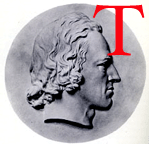
he 95th section of Tennyson's In Memoriam is often regarded as the poem's climax. There Tennyson deploys euphonious language and vivid metaphors to convey the "silent-speaking words" of his mystical reunion with Hallam's spirit. The linguistic medium of Tennyson's transcendence foregrounds what I see as a central tension. Namely, the richness of poetic language contravenes the ineffable spirituality Tennyson strives towards. I would like to explore this contradiction by focusing on how Tennyson treats the textuality of his revelation:
A hunger seized my heart; I read
Of that glad year which once had been,
In those fallen leaves which kept their green,
The noble letters of the dead.
And strangely on the silence broke
The silent-speaking words, and strange
Was love's dumb cry defying change
To test his worth; and strangely spoke
The faith, the vigor, bold to dwell
On doubts that drive the coward back,
And keen thro' wordy snares to track
Suggestion to her innermost cell.
So word by word, and line by line,
The dead man touch'd me from the past,
And all at once it seem'd at last
The living soul was flash'd on mine. [lines 21-36]
Tennyson's hunger for reading produces a strangely uneven metaphor. On one level, "fallen leaves" are the figurative vehicle for Hallam's "noble letters." Yet, as if to put this metaphor aside, these uncanny leaves retain their vividness as an independent image; they keep their "green." The metaphorical vehicle in turn literalizes itself such that the "fallen leaves," or pages, of Hallam's writing exist on equal rhetorical footing with the "noble letters of the dead." To put the matter schematically, Tennyson would find Hallam through reading. The problem is that the metaphorical and literal registers of Tennyson's literary practice both bolsters and undercuts the promise of its endeavor. Tennyson hereby places a limit his expectation that reading will ever amount to more than just reviewing the "noble letters of the dead."
To put this point differently, my sense is that the rhetoric of reading simultaneously elevates and deflates the power of Tennyson's figuration. The strangeness of "silent-speaking words" arrives with Tennyson's intuitive recognition that reading "noble letters of the dead" are a fraught hope. Where Tennyson is "keen thro' wordy snares to track / Suggestion to her innermost cell," he acknowledges a double entrapment. "Wordy snares" will not only waylay his effort to "track" the traces of his reminiscences to the core of his memories about Hallam, but words themselves produce the misleading "keenness" or eagerness of Tennyson's pursuit. In noting the accidents of language — its "wordy snares" — Tennyson posits an ineffability towards which he constantly reaches. Having said this, the misplaced concreteness of Hallam's embodiment "word by word, and line by line" points up the shaky grounds of Tennyson's transcendence when "living soul was flash'd on mine." On this basis, I would want to further explore how Tennyson elevates the figurative capabilities of his language while simultaneously underscoring the need to jettison such vehicles as irreparably flawed. In other words, I would like to better understand the romantic skepticism of Tennyson's poetry.
Last modified 26 September 2006